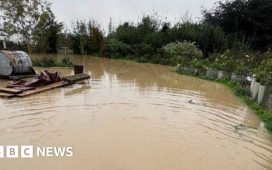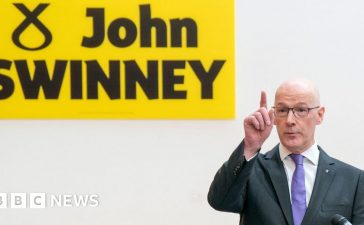Stay informed with free updates
Simply sign up to the Labour Party UK myFT Digest — delivered directly to your inbox.
This article is an on-site version of our Inside Politics newsletter. Sign up here to get the newsletter sent straight to your inbox every weekday
Good morning. Labour has won the Rutherglen by-election, exceeding all expectations. Some thoughts about what it means and the challenge for the Conservatives in England in today’s note.
Inside Politics is edited by Georgina Quach. Follow Stephen on X @stephenkb and please send gossip, thoughts and feedback to insidepolitics@ft.com
Swingers’ party
Labour took home a resounding victory in the Rutherglen and Hamilton West by-election. The 20 per cent swing from the Scottish National party to Labour is well in excess of anything the party needed to get to show proof of life in Scotland.
Yes, all of the caveats I wrote about yesterday apply: this is one of the Labour party’s easiest targets in Scotland and the by-election was triggered by the removal of an SNP incumbent who was found to have broken Covid rules. Added together, these circumstances made it a particularly difficult contest for the SNP. This isn’t a result that tells us all that much. But it does tell us something, given the size and scale of Labour’s victory.
It means that when Keir Starmer says that this is a sign Labour is on the way back to government, and that his party is on the road to recovery in Scotland, that is not just talk. His attempts to reassure voters in England who are nervous about a potential Labour-SNP collaboration can now find support in something real and tangible.
That is true outside of England, too. I remember the moment in 2015 when I realised just how much damage the prospect of a deal with the SNP was doing to Labour hopes. I was out reporting in the Vale of Glamorgan, a perennial marginal in Wales, where the fear among swing voters that a deal with the SNP would result in a radical government with less money for Wales was just as strong as it was in England’s marginals.
And it is yet another good steer — along with the local and by-elections — that the opinion polls showing Labour advancing across the UK are about right.
But the most important thing about this by-election is what it allows Labour to say in England: far and away the largest part of the UK, of course, and the place where the next election will be decided. That Labour have shown that it can win and win well in Scotland makes its path to a majority easier both numerically (in that it means the party can hope to make gains in Scotland) but even more importantly, politically (because this means Labour will find it easier to avoid getting sucked into talk of coalitions and deals with the SNP).
All in all, Starmer cannot have hoped for a better result as he prepares for his own party conference in Liverpool.
Keir today, gone tomorrow
That isn’t to say that a Labour victory at the next election is guaranteed. Far from it.
Here’s a striking statistic from Robert Shrimsley’s column this week:
[Conservative party] pessimism is logical. But there is a crumb of comfort in the new polling data presented to Keir Starmer’s team. Labour strategists were told that while 79 per cent of voters answered yes to the question “Does the country need a change from the Conservative party?”, the figure fell to 37 per cent when people were asked if the country needed a change to Labour. In the gap is Sunak’s opportunity.
One reason why the next election is up for grabs is that British voters are swingier than ever: we are, on the whole, much more likely to flit between the parties and much more happy to vote for a whole swath of parties. I think this fact is often downplayed because although there were plenty of outsized swings at the 2019 general election, the overall result was essentially what most people at Westminster expected. We didn’t notice how emphatic the swing to the Conservatives in Redcar was because everyone expected a swing to the Conservatives in Redcar. We didn’t notice the swing from the Conservatives in St Albans, because, well, it didn’t matter at all in the grand scheme of things.
But that volatility, and voters’ openness to flit around the political parties means that people can and might change their minds and that gives the Conservatives a real chance of turning things around — and it means Labour is at real risk of self-destructing.
For the Tory party to turn it round though, the party is going to need to buck its ideas up. Rishi Sunak’s team will need to think more deeply, both about what they want to do, but, equally importantly, about the Labour party they are actually facing and how to defeat it. Here’s a striking example of the problem from our story about Keir Starmer’s decision to deliver the “coup de grâce” to HS2, by refusing to commit to reversing Sunak’s cuts to HS2:
Sunak’s allies had hoped to wrong foot Starmer by challenging him to commit to the full HS2 route. The Conservatives would then have asked how he would pay for the other transport projects promised by the prime minister.
Anyone who takes a serious look at Starmer’s Labour party would conclude that there was never any prospect at all of them committing to the full HS2 route. Starmer’s Labour has a mortal fear of being seen to spend, borrow or tax too much. If it has a vulnerability in this area, it is excessive caution and a reluctance to say anything distinctive, not a predilection for committing to multibillion pound infrastructure projects.
If Sunak wants to change his party’s trajectory, one thing he needs to do is get a better sense of his major political opponent and its vulnerabilities. But if Starmer wants to protect his lead, and close the gap between the large majority of voters who want some kind of change and the plurality of voters who think he is the change they need, he needs to find a way to balance caution with having something to say.
Now try this
I’m off to Liverpool this weekend, mainly for the Labour conference, but I’m also hoping to take a final look around the Tate Liverpool before it temporarily closes for refurbishment (although the permanent collection will still be on display nearby throughout the works). Another Tate exhibition well worth seeing, which runs until 14 January, is the Casablanca Art School exhibition at the Tate St Ives, which I visited over my summer holidays and very much enjoyed. Also make sure to stop in at the Barbara Hepworth Garden, also in St Ives, which is beautiful in a different way in every season.
However you spend it, have a wonderful weekend!
Top stories today
-
The cash dragged in | The extra tax haul from Rishi Sunak’s multiyear freeze to income tax allowances and thresholds is set to reach £40bn a year by 2028 because of stubborn inflation — £10bn more than estimated just a few months ago — according to research.
-
Sunak and Meloni united on small boats | The prime ministers of the UK and Italy have united to demand tougher action across Europe on irregular migration, after finalising a pact with like-minded nations to deepen co-operation on the issue.
-
Corbyn staff court case | The Labour party has spent £1.4mn in legal fees on a bitter dispute with five former staff accused of leaking an internal report and expects to spend another £868,000 as the case progresses, according to a court document seen by the Financial Times.
-
House price fall | UK house prices dropped for the sixth consecutive month in September, according to mortgage provider Halifax, laying bare the effect of high mortgage rates on the property market as Britons struggle to afford new homes.
-
Party of business? | The shadow chancellor has dropped a flagship announcement on business from her Labour conference speech after some of Britain’s biggest companies pulled out because of interventions by senior Conservatives, the Times’s Steven Swinford and Richard Fletcher report.












